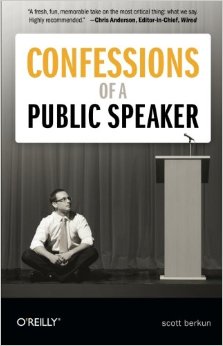The notes I write down this time are about the book “Confession of a Public Speaker“, by Scott Berkun. Public speaking is one thing I do time to time, but I’ve been doing since lot of time. I had my first talk in 2005 and it was about “802.11b Insecurity“. Good book, with lot of real-life considerations and suggestions, many of which I’ve learned first-person during those years.

If I plan to do something in the presentation, I practice it. But I don’t practice to make perfect, and I don’t memorize. If I did either, I’d sound like a robot, or worse, like a person trying very hard to say things in an exact, specific, and entirely unnatural style, which people can spot a mile away. My intent is simply to know my material so well that I’m very comfortable with it. Confidence, not perfection, is the goal.
The slides are not the performance: you, the speaker, are the performance
It’s possible I’m not a better public speaker than anyone else – I’m just better at catching and fixing problems.
I admit that even with all my practice I may still do a bad job, make mistakes, or disappoint the crowd, but I can be certain the cause will not be that I was afraid of, or confused by, my own slides. An entire universe of fears and mistakes goes away simply by having confidence in your material.
Talking to some people in the audience before you start (if it suits you), so it’s no longer made up of strangers (friends are less likely to try to eat you)
Place matters to a speaker because it matters to the audience
You can play lecture drinking games with your friends, such as “ummmster,” where you do a shot of your favorite cocktail every time the speaker says “ummm.” With some speakers, you’ll be passed out in no time.
Most importantly, the density theory amplifies your energy. We’re social creatures. If five people – or even dogs, raccoons, or other social animals – get together, they start to behave in shared ways. They make decisions together, they move together, and most importantly, they become a kind of short-term community. The size of the room or the crowd becomes irrelevant as long as the people there are together in a tight pack, experiencing and sharing the same thing at the same time.
Ask the crowd if they’re too cold or too warm, and then, on the mike, ask the organizers to do something about it (even if they can’t, you look great by being the only speaker to give a care about how the audience is feeling).
Now I know I have to embody what I want the audience to be. If I want them to have fun, I have to have fun. If I want them to laugh, I have to laugh. But it has to be done in a way they can connect with, which is hard to do. A drunken toast at a wedding is often great fun for the toaster but miserable for everyone else. But great speakers are connection-makers, sharing an authentic part of themselves to create a singular, positive experience for the audience.
I’ve learned that by far the thing people seem angriest about is dishonesty. Show some integrity by speaking the truth on the very thing that angers them, or even acknowledging it in a heartfelt way, and you will score points. People with the courage to speak the truth into a microphone are exceptionally rare.
Request the names of three people to interview who are representative of the crowd you will speak to. See if your fears are real or imagined. Then, when giving your talk, make sure to mention, “Here are the three top complaints I heard from my research with Tyler, Marla, and Cornelius.” Including the audience in your talk will score you tons of points. Few people ever do this, and if the rest of the crowd disagrees with Tyler, Marla, or Cornelius, they can sort that out on their own after you leave.
The story is often told to suggest Lincoln’s brilliance – that he could just scribble one of the greatest speeches of all time in a few spare moments while riding on a train. It’s a story that inspires many to forgo preparing in favor of getting up on stage and winging it, as if that’s what great leaders and thinkers do. The fallacy of the legend is to assume that the only moments Lincoln spent thinking about the points he would make in the speech took place as he wrote them. That somehow he never thought about the horrors of the Civil War, the significance of human sacrifice, and the future of the United States except while he wrote down the words of the address on a random scrap of paper.
Continue reading “Confession of a Public Speaker book notes”